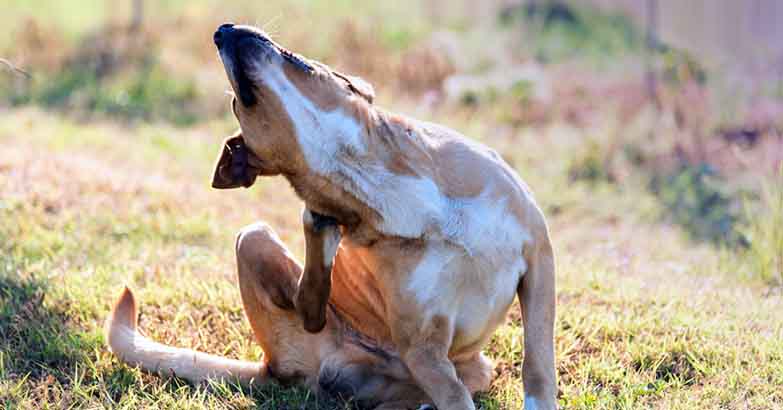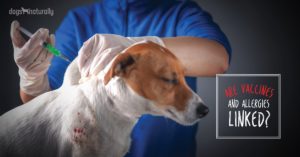When your dog is suffering with allergies and skin issues, you need to find ways to help relieve the itching and discomfort. So you may try topical treatments like shampoos, rinses and salves. They may make your dog feel better … temporarily. But it goes deeper than that.
Skin problems in dogs aren’t just on the outside. Your dog’s skin issues are an external symptom that reflects an internal problem … so topical solutions aren’t enough.
Instead, you need remedies like natural antihistamines for dogs to help your dog’s body maintain a healthy immune response to allergens in his food and environment. Then you can get to the root of the problem and resolve skin health from the inside. By bringing your dog’s organs and immune function into balance, you’ll promote his overall health … and not just manage his allergies superficially.
What Are Antihistamines?
Allergies are an improper immune response to a substance in your dog’s environment or food. It could be pollen, mold, dust or chemical pollutants, or something in your dog’s food like wheat, corn, soy or a protein he’s sensitive to. And when your dog absorbs that substance through his nose, mouth, lungs or digestive system, something that’s normally harmless can trigger the release of histamine … causing allergic responses like inflammation and itching.
Histamine is part of the immune system that causes allergy symptoms, like itching, skin irritation, sneezing or even digestive problems like diarrhea. Antihistamines block the histamine response and can stop the allergic reaction.
That’s why vets often prescribe drugs like Benadryl – an over the counter antihistamine. Antihistamine drugs may suppress symptoms temporarily, but they don’t get to the root of the problem to stop your dog’s body from reacting. And Benadryl isn’t safe for your dog.
But there are natural remedies that can support your dog’s body and help stop the histamine response.
5 Natural Antihistamines For Dogs
Here are 5 top natural remedies to support your dog’s overall health and help manage his allergic reactions.
Quercetin
Quercetin is a flavonoid (type of antioxidant) … with antihistamine and anti-inflammatory properties. It’s found naturally in foods like berries, apples (especially the skin), citrus fruits, dark cherries and parsley.
Quercetin is known as “Nature’s Benadryl” because of its proven ability to turn off histamine production and control inflammation. Research shows quercetin helps manage cellular responses associated with inflammation … and that helps reduce itching.
Quercetin also helps block mast cells, which are immune cells that trigger allergic reactions, as well as inflammatory diseases, including dermatitis. Some people take quercetin for ezcema.
While respiratory allergic reactions are less of a problem with dogs, people who get asthma attacks find they breathe easier with quercetin, because it dilates the bronchial tubes.
Other side benefits of quercetin are its ability to help prevent all kinds of inflammatory disorders, ihncluding arthritis, diabetes and eye problems. Research shows it may support heart health and help fight cancer.
How To Give Your Dog Quercetin
You can give quercetin to your dog as a supplement, as well as adding some quercetin-rich foods to his diet (onion is on the list, but please don’t give that to your dog). Supplements often include the enzyme bromelain, which can increase the bioavailability of quercetin.
Some quercetin supplements are liposomal, meaning the nutrients are encased in a tiny fat-like particle (called a liposome). Liposomal supplements are usually more absorbable and help the nutrient reach specific cells in the body. The fats are similar to those that form cell membranes, so they bond to the membranes, which helps them deliver nutrients.
Most quercetin supplements are packaged for humans, so assume it’s for a 150 lb person and adjust the dose for your dog’s weight. If your supplement is made for dogs, follow the package instructions. Typical dosing is about 5-10 mg per pound of body weight, twice per day … translating to about 100-200 mg twice a day for a 20 lb dog.
RELATED: Read more about quercetin’s health benefits …
Nettles
Nettles are also known as “stinging nettles” … because of the itchy rash they cause when they touch your skin.
The reason for that rash is that nettles actually contain histamines. But studies show that when nettles are taken internally, they stimulate the body to protect itself from allergens. Nettles also contain natural quercetin, boosting the anti-allergy effects.
According to herbalist Gregory L Tilford, nettle’s allergenic activities may mimic or slow the release of histamines in the body. Another theory is that they trigger an immune response that strengthens the body proactively to reduce the allergic reaction.
Nettles are also a very nourishing herbs that contain protein, minerals like iron, phosphorus, magnesium, potassium and beta carotene, plus vitamins A, C, D and B-complex. They’re also rich in the green pigment, chlorophyll, which helps prevent cell damage and remove heavy metals.
Nettle also has benefits for the eyes, and nettle leaf tea can make a good eye rinse to ease mild eye irritation or conjunctivitis.
How To Give Your Dog Nettles
If they grow nearby, you can pick nettles yourself … but wear good gloves so you don’t get stung. Then dry the herbs, or make nettle leaf tea, or sauté fresh nettles in a pan with pastured butter or MCT oil until tender, and add to your dog’s food.
You can also use dried herbs or nettle tincture. Give 2 drops per 10 lbs of your dog’s body weight per day, or give ½ tsp of dried nettle to each cup of food at mealtimes.
Chinese Skullcap
Chinese Skullcap has been used for centuries in Chinese medicine to relieve inflammation, allergies and even anxiety.
Note: we’re talking about Chinese skullcap, Scutellaria baicalensis, and not American skullcap, Scutellaria lateriflora, which is a different plant, with different properties.
Chinese skullcap can help dogs with allergies and skin problems thanks to its antihistamine effects that help lower histamine levels in the body.
The herb also helps manage the inflammatory response to allergens, because it reduces IgE antibodies and cytokine levels. IgE antibodies identify allergens, so when an allergen enters your dog’s body, they alert the immune system to react. Cytokines are signaling proteins that help regulate inflammation by activating immune cells. Lowering IgE and cytokines will help reduce your dog’s allergic reaction.
Chinese skullcap is also rich in antioxidants called flavonoids that help manage oxidative stress in your dog.
As an added bonus, Chinese skullcap has also been shown to ease anxiety, protect neuronal cells, and even promote apoptosis (cell death) in certain types of cancers. It’s also used to treat Lyme disease thanks to its antibacterial effects.
How To Give Your Dog Chinese Skullcap
First of all, make sure you buy the right skullcap. As mentioned earlier you want Chinese skullcap, known as Scutellaria baicalensis, and not American skullcap, Scutellaria lateriflora.
The easiest way to give Chinese skullcap to your dog is in tincture form, giving ⅛ tsp twice daily for a 25 lb dog (adjust according to your dog’s weight).
L-Theanine
Have you heard that green tea helps allergies? Many people drink green tea for its antihistamine effects. One of the reasons for that is its L-theanine content.
L-theanine is an amino acid in green and black tea, as well as in some mushrooms. It’s well known to relieve anxiety, and if you look online you’ll find many L-theanine products promoted to manage stress in dogs.
But L-theanine’s calming effects can also help moderate your dog’s histamine response to help relieve allergy symptoms. Research also shows it has anti-inflammatory and antioxidant properties and supports healthy immune function. Any skin problem in your dog is the result of chronic inflammation and an improper immune response, so these are essential properties when it comes to resolving allergies in dogs.
How To Give Your Dog L-Theanine
For dogs, L-theanine is most often sold in tablet form. Dosage for a 10-20 lb dog is 100 mg up to 3 times a day.
Caution: Make sure you buy a product made for dogs, as some human L-theanine supplements contain xylitol, a sweetener that’s deadly to dogs.
Irish Moss
Irish moss (also called sea moss) isn’t really moss, but an edible red seaweed or algae. It’s rich in vitamins, minerals and antioxidants, and it’s especially well-known for its ability to support thyroid function because of its iodine content.
While it’s not technically a natural antihistamine, we’ve included Irish moss in this list because it offers great support for skin health.
One of the most important actions of Irish moss is its ability to absorb heavy metals, which means it’s a food that can help remove heavy metals from your dog’s body. Heavy metals impact your dog’s health in many ways, leading to serious problems like liver, kidney, heart and neurological damage.
And yeast loves heavy metals, so getting them out of your dog’s body can help reduce yeasty skin. Heavy metal detox is extremely important for your dog’s overall health.
RELATED: How to get rid of yeast infection in dogs …
Irish moss is also known to boost immunity, thanks to its high vitamin C and antioxidant content. And its ability to support skin health makes it popular in skin masks to soothe skin conditions like dermatitis, psoriasis and eczema. Research shows that citrulline–arginine found in Irish moss can improve cell growth and metabolism, as well as releasing amino acids that support protein and collagen synthesis, both essential for healthy skin and coat,
Irish moss is also high in soluble fiber that supports digestive health.
Carrageenan In Irish Moss
Irish moss can be controversial because of its natural carrageenan content. But when you’re giving it in its natural, whole food form, you don’t need to worry.
Highly processed carrageenan extracts are used in products like ice cream, beer, jelly, yogurt and diet drinks, as well as shampoo, toothpaste, and gel air fresheners. It’s also used in dog food, where we consider it an unsafe ingredient.
But there’s a big difference between natural carrageenan in a whole food like Irish moss and the industrially-produced carrageenan food additive … that’s extracted using toxic chemical solvents like potassium hydroxide.
Carrageenan in its natural whole food state is safe for your dog.
How To Give Your Dog Irish Moss
When you buy Irish moss, look for a product that’s been tested for contaminants and buy a high quality supplement from a reputable source.
You can give Irish moss to your dog in dried powder form. It’s easy to sprinkle on food, giving 1g per 10 lbs of your dog’s body weight per day.
These are just a few of our favorite herbs to benefit your dog’s skin health and help manage allergies, whether to food or environmental substances.
References
Jafarinia M, Sadat Hosseini M, et al. Quercetin with the potential effect on allergic diseases. Allergy Asthma Clin Immunol. 2020 May 14;16:36.14;16:36.
Mlcek J, Jurikova T, Skrovankova S, Sochor J. Quercetin and Its Anti-Allergic Immune Response. Molecules. 2016 May 12;21(5):623.
Ayers S, Roschek B Jr, Williams JM, Alberte RS. Pharmacokinetic analysis of anti-allergy and anti-inflammation bioactives in a nettle (Urtica dioica) extract. Herbal Science Group LLC.
Jung HS, Kim MH, Gwak NG, Im YS, Lee KY, Sohn Y, Choi H, Yang WM. Antiallergic effects of Scutellaria baicalensis on inflammation in vivo and in vitro. J Ethnopharmacol. 2012 May 7;141(1):345-9.
Shin HS, Bae MJ, Choi DW, Shon DH. Skullcap (Scutellaria baicalensis) extract and its active compound, wogonin, inhibit ovalbumin-induced Th2-mediated response. Molecules. 2014 Feb 21;19(2):2536-45.
Ahmadi A, Mortazavi Z, Mehri S, Hosseinzadeh H. Scutellaria baicalensis and its constituents baicalin and baicalein as antidotes or protective agents against chemical toxicities: a comprehensive review. Naunyn Schmiedebergs Arch Pharmacol. 2022 Nov;395(11):1297-1329.
Li MY, Liu HY et al, L-Theanine: A Unique Functional Amino Acid in Tea (Camellia sinensis L.) With Multiple Health Benefits and Food Applications. Front Nutr. 2022 Apr 4;9:853846.
Williams J, Kellett J, Roach P, et al. l-Theanine as a Functional Food Additive: Its Role in Disease Prevention and Health Promotion. Beverages. 2016;2(2):13.
Rajapakse N, Kim SK. Nutritional and digestive health benefits of seaweed. Adv Food Nutr Res. 2011;64:17-28.









